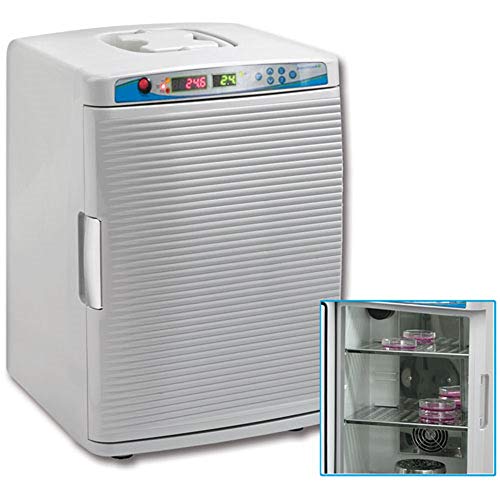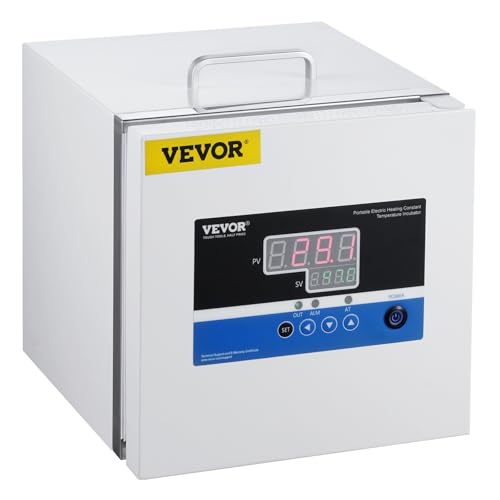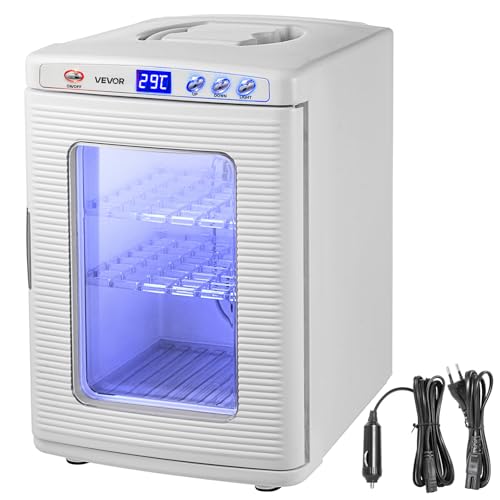When it comes to cell culture and research, choosing the right CO2 lab incubator can make all the difference in your results. With a variety of options available, from compact models to larger units, it’s crucial to find one that meets your specific needs. Each incubator offers unique features like advanced temperature control and CO2 monitoring. So, which one will best support your experiments? Let’s explore the top contenders.
Benchmark My Temp Mini Incubator Digital CO2 and Temperature Control
If you’re looking for a compact yet efficient solution for CO2 control in cell culture, the Benchmark My Temp Mini Incubator is an excellent choice. Its 20L capacity fits bottles and flasks up to 2 liters, while dual stainless-steel shelves enhance airflow. You’ll appreciate the digital control for temperature and CO2 levels, displayed in real time on a user-friendly LED panel. High-efficiency insulation maintains stable temperatures, even after power loss. Plus, with advanced CO2 monitoring and alarms, you’ll stay informed about your culture’s environment. The humidity reservoir adds moisture, creating the ideal conditions for sensitive cultures.
Best For: Researchers and laboratories seeking a compact incubator for CO2 control in cell culture applications.
Pros:
- Digital control allows for precise adjustments of temperature and CO2 levels.
- High-efficiency insulation maintains stable temperature conditions, even during power interruptions.
- Humidity reservoir enhances the growth environment for sensitive cultures by adding moisture.
Cons:
- Limited capacity of 20L may not be sufficient for larger experiments or multiple cultures.
- The audible alarms may be disruptive in quiet lab environments.
- Portability relies on a 12V vehicle power adapter, which may not be universally compatible.
VEVOR Lab Incubator (6L, PID Temperature Control)
The VEVOR Lab Incubator stands out for its precise PID temperature control, making it an excellent choice for researchers and technicians focused on cell culture and microbiological applications. With a 6L capacity, it’s perfect for biological cultures, microorganism propagation, and even plant growth. Its durable design features a cold-rolled steel exterior and stainless steel interior, ensuring longevity. The intelligent PID technology allows for adjustments within ± 2℃, while the thermal convection system guarantees even temperature distribution. Although some users noted issues with instructions and packaging, the incubator’s performance remains solid for ideal research conditions.
Best For: Researchers and technicians focused on microbiological applications, cell culture, and biological experiments.
Pros:
- Precise PID temperature control allows for adjustments within ± 2℃.
- Durable construction with cold-rolled steel exterior and stainless steel interior ensures longevity.
- Thermal convection system provides even temperature distribution for optimal conditions.
Cons:
- Some users reported uninformative instructions, causing confusion during setup.
- Issues with damaged doors were noted upon unpacking, despite careful packaging.
- Limited capacity of 6L may not suit larger experimental needs.
IVYX Scientific 5L Incubator
For those seeking a compact and versatile incubator, the IVYX Scientific 5L Incubator stands out as an excellent choice. With dimensions of 11 x 6 x 12 inches and a weight of just 8.4 lbs, it’s easy to fit in any lab space. You’ll appreciate its precise temperature control, ranging from 0°C to +55°C, allowing for a 0.5°C gradient. This incubator also functions as both a refrigerator and a warm incubator, making it perfect for growing yeast or conducting various scientific projects. Plus, its power options, including a 12V car adapter, enhance portability for on-the-go research.
Best For: The IVYX Scientific 5L Incubator is best for scientists and hobbyists looking for a compact and versatile incubator for various applications, including yeast cultivation for sourdough bread making.
Pros:
- Precise temperature control with a range of 0°C to +55°C in 1°C increments.
- Compact and lightweight design makes it easy to fit in small lab spaces and enhances portability.
- Dual functionality as both a refrigerator and warm incubator, suitable for diverse scientific projects.
Cons:
- Limited internal capacity of 5L may not be sufficient for larger experiments.
- Temperature fluctuations of 0.5°C between the top and bottom can affect sensitive experiments.
- Best Sellers Rank indicates it may not have widespread recognition compared to other incubators.
VEVOR 20L Lab Incubator for Bacterial Culture
Designed specifically for scientific applications, the VEVOR 20L Lab Incubator stands out as an ideal choice for researchers focused on bacterial culture. With a temperature range of RT+5-65℃, it provides optimal conditions for your microbial studies. The high-quality steel construction and 304 stainless steel inner tank offer durability, while adjustable shelf brackets and a transparent window enhance usability. Its intelligent PID control guarantees fast, stable temperature management, and the thermal convection system promotes uniform heat distribution. Whether you’re in agriculture, medical science, or academia, this incubator meets diverse research needs effectively.
Best For: Researchers and professionals in fields such as agriculture, medical science, and academia who require precise temperature control for bacterial culture and microbial studies.
Pros:
- High-quality construction with durable steel and stainless steel materials ensures longevity and safety.
- Intelligent PID control system provides fast and stable temperature management for reliable results.
- The thermal convection system guarantees uniform temperature distribution, enhancing the effectiveness of experiments.
Cons:
- The 20L capacity may be limiting for larger scale research projects or high-volume cultures.
- The price point may be higher compared to basic incubators, potentially affecting budget-conscious users.
- Limited temperature range might not be suitable for all types of bacterial strains requiring specific environmental conditions.
IVYX Scientific 25L Incubator
With precise temperature control ranging from 2°C to 60°C, the IVYX Scientific 25L Incubator is an excellent choice for researchers and hobbyists alike. It cools down about 20°C below ambient temperature and heats up to 60°C, maintaining fluctuations of only 0.5°C on the same shelf. This versatile unit functions as both a refrigerator and warm incubator, making it perfect for various projects, including yeast growth for sourdough bread. Its compact design measures 19x16x13 inches externally and has a 25L capacity, while its lightweight, portable nature—with a 110V power cord and 12V car adapter—ensures convenience wherever you go.
Best For: The IVYX Scientific 25L Incubator is best for researchers and hobbyists seeking a reliable solution for temperature-sensitive experiments and projects, including yeast cultivation for baking.
Pros:
- Precise temperature control with minimal fluctuations makes it ideal for sensitive experiments.
- Versatile functionality allows it to serve as both a refrigerator and incubator.
- Portable design with both 110V power cord and 12V car adapter ensures convenience for on-the-go use.
Cons:
- Limited capacity of 25L may not be suitable for larger projects.
- Temperature range might not accommodate all specialized scientific needs.
- Small footprint may limit internal shelving options for larger items.
Electric Heating Constant Temperature Lab Incubator (22L)
The Electric Heating Constant Temperature Lab Incubator (22L) stands out as an excellent choice for researchers and hobbyists who need reliable temperature control for sensitive experiments. With a capacity of 22 liters and dimensions of 11x11x11 inches, it fits snugly in any workspace. You can easily adjust the temperature from room temperature to 70°C (0-158°F), ensuring ideal incubation conditions. Its durable galvanized construction and hot air circulation system guarantee even heat distribution. Featuring a transparent window and bright digital display, monitoring is straightforward. Users appreciate its quiet operation, making it perfect for various applications like bacterial culture and seed germination.
Best For: Researchers and hobbyists needing reliable temperature control for sensitive experiments.
Pros:
- Durable galvanized construction ensures longevity and corrosion resistance.
- Hot air circulation system provides uniform temperature distribution for consistent results.
- Transparent window and bright digital display facilitate easy monitoring of conditions.
Cons:
- Some users reported shipping issues, such as damaged or missing parts.
- Limited temperature range may not meet the needs of all specialized applications.
- Quiet operation might lead to less awareness of any potential problems or malfunctions.
GAOMON Lab Incubator 20L RT-65℃ with PID Temperature Control
For researchers and scientists seeking reliable temperature management in their experiments, the GAOMON Lab Incubator 20L RT-65℃ stands out with its intelligent PID temperature control. This incubator features high-quality cold-rolled steel construction with a 304 stainless steel inner tank, ensuring durability. Its double-layer toughened glass window allows you to monitor conditions easily. With precise temperature management up to 65°C, you’ll benefit from overtemperature alarms and self-tuning capabilities. The ultra-thick tempered glass and double silicone seals minimize heat loss, making it ideal for applications in agriculture, medical science, and laboratories. Achieve accurate results with this essential incubator.
Best For: Researchers and scientists in need of precise temperature control for experiments in agricultural and medical applications.
Pros:
- Durable construction with high-quality cold-rolled steel and stainless steel inner tank for longevity.
- Intelligent PID temperature control ensures accurate and stable temperature management.
- Double-layer toughened glass window provides excellent visibility for monitoring conditions.
Cons:
- Limited maximum temperature of 65°C may not be suitable for certain applications requiring higher temperatures.
- Size may be restrictive for larger experiments or bulk sample processing due to its 20L capacity.
- Potentially higher price point compared to basic incubators without advanced features.
VEVOR Reptile Incubator (25L Automatic Cooling and Heating)
Designed specifically for reptile and poultry enthusiasts, the VEVOR Reptile Incubator offers a versatile solution for incubating eggs in a controlled environment. With a spacious 25L chamber, you can adjust the temperature from 5°C to 42°C in precise 1°C increments. The user-friendly LED screen and external buttons make temperature adjustments easy, while the built-in fan guarantees excellent air circulation. You’ll appreciate the removable shelves and water tray for humidity control, along with the visible PVC door for monitoring. This incubator operates on dual power cords, perfect for both home and car use, meeting various incubation needs seamlessly.
Best For: Reptile and poultry enthusiasts looking for a reliable and versatile incubator for hatching eggs.
Pros:
- Precise temperature control with adjustable settings from 5°C to 42°C in 1°C increments.
- User-friendly design featuring an LED digital screen and external buttons for easy adjustments.
- Dual power options allow for use at home or in a car, enhancing portability.
Cons:
- Limited capacity of 25L may not be sufficient for larger scale incubation needs.
- Weight of 13.2 lbs may make it less portable for some users.
- Requires monitoring due to the need for humidity control with the water tray.
Quincy Lab 10-140 Analog Incubator
Ideal for labs needing precise temperature control, the Quincy Lab 10-140 Analog Incubator offers stability within +/- 0.75 degrees C at 37 degrees C, making it a reliable choice for warming cultures, test kits, and biological samples. With a temperature range from ambient + 2 to 62 degrees C, it suits various applications in clinical, industrial, and academic settings. The sturdy aluminum interior and powder-coated steel exterior guarantee durability. Its tinted acrylic door maintains temperature consistency while providing safety. The bimetal controller and illuminated indicators make monitoring easy, so you can focus on your research with confidence.
Best For: The Quincy Lab 10-140 Analog Incubator is best for laboratories in clinical, industrial, and academic settings that require precise temperature control for biological samples, cultures, and test kits.
Pros:
- Stable Temperature Control: Maintains temperature stability within +/- 0.75 degrees C, ensuring reliable results.
- Durable Construction: Features a sturdy aluminum interior and powder-coated steel exterior for long-lasting use.
- User-Friendly Design: Equipped with a bimetal controller and illuminated indicators for easy monitoring and operation.
Cons:
- Limited Capacity: With an internal capacity of only 0.7 cubic feet, it may not be suitable for larger samples or multiple items simultaneously.
- Analog Controls: The analog temperature control may not provide the precision of digital models.
- Weight: At 25 lbs., it may be less portable compared to lighter incubator options.
Microplate Filter Cartridge for Thermo CO2 Incubator
The Microplate Filter Cartridge for Thermo CO2 Incubators stands out due to its compatibility with a wide range of Thermo models, making it a reliable choice for researchers who frequently work with cell culture. This cartridge is designed for Thermo Forma 3110 and works seamlessly with the 371, 381, 3423, and 3543 CO2 incubators. Utilizing Micro Disc Filtration technology, it secures effective filtration, enhancing the performance of your incubator. Whether you’re using the Thermo Scientific 8000 Series or the Forma Steri-Cycle models, this cartridge guarantees ideal conditions for your experiments, allowing you to focus on your research with confidence.
Best For: Researchers and laboratories utilizing Thermo CO2 incubators for cell culture applications.
Pros:
- Wide compatibility with various Thermo CO2 incubator models, ensuring versatility in usage.
- Enhanced filtration performance through Micro Disc Filtration technology, promoting optimal experimental conditions.
- User-friendly design that simplifies the replacement process, saving time and effort in laboratory settings.
Cons:
- Limited to Thermo incubators, which may not be suitable for users with equipment from other manufacturers.
- Potentially higher cost compared to generic filters, which could impact budget-conscious labs.
- Availability issues may arise, as specific models might be hard to find in certain regions.
Factors to Consider When Choosing a CO2 Lab Incubator
When you’re choosing a CO2 lab incubator, several key factors come into play. You’ll want to take into account temperature control precision, CO2 level monitoring, and the size and capacity that best fits your needs. Don’t forget about insulation efficiency and portability features, as these can greatly impact your lab’s workflow.
Temperature Control Precision
Understanding temperature control precision is vital for selecting the right CO2 lab incubator, especially since even slight fluctuations can impact your cell cultures. Look for models that allow adjustments within a range of ± 1°C to ± 2°C to maintain ideal growth conditions. Some incubators can even guarantee a temperature gradient of only 0.5°C within the chamber, enhancing uniformity. Advanced technologies like PID control enable rapid and stable temperature adjustments, making your incubation environment more reliable. Additionally, the ability to cool down to specific temperatures—often around 20°C below ambient—is significant for certain applications. Finally, consider incubators that can sustain set temperatures for up to an hour during power interruptions to minimize disruptions to your research.
CO2 Level Monitoring
Maintaining ideal CO2 levels is just as important as temperature control in your lab incubator. Most cell lines thrive in a CO2 concentration of about 5%, so precise monitoring is essential for optimal growth. Look for advanced incubators that use dual beam infrared sensing technology, as they provide real-time CO2 measurement and accurate control. Many models come with audible and visual alarms to alert you if CO2 levels dip below set parameters, protecting your sensitive cultures. Additionally, some incubators can sustain CO2 levels for a while after losing gas supply, typically decreasing by about 1% every 30 minutes. Don’t forget to regularly calibrate CO2 sensors to guarantee accuracy, as fluctuations can greatly impact your experimental outcomes.
Size and Capacity
Choosing the right size and capacity for your CO2 lab incubator is essential to guarantee it meets your experimental needs. You’ll find options ranging from smaller units (about 5L) to larger ones exceeding 25L. Consider the incubator’s dimensions to ensure it fits your lab space while allowing for proper airflow and easy access. A larger capacity can help you incubate multiple samples or larger volumes, which is significant when scaling up experiments. Pay attention to the internal configuration, as the number and adjustability of shelves impact space efficiency. Finally, make certain the incubator’s capacity aligns with your specific applications, whether you need room for flasks or prefer compact designs for smaller cultures.
Insulation and Efficiency
After evaluating size and capacity, insulation and efficiency become vital for ensuring ideal performance in a CO2 lab incubator. High-efficiency insulation helps maintain stable temperature levels, minimizing fluctuations essential for peak growth conditions. Look for models that retain temperature settings for up to one hour after a power loss, enhancing reliability during outages. Effective insulation also reduces energy consumption, making your incubator more economical and environmentally friendly. Incubators with double silicone seals and insulated construction considerably minimize heat loss, keeping temperature deviations within a narrow range. Additionally, proper insulation promotes uniform temperature distribution, ensuring consistent growth and reducing risks associated with harmful temperature gradients. Prioritizing these features will support your cell culture success.
Portability Features
When evaluating a CO2 lab incubator, portability features play an essential role, especially if you need to move it between various locations. Look for models with a compact design and lightweight construction to make transport easier. Dual power options, such as standard AC and 12V DC, allow you to operate the incubator both in the lab and on the go, like during fieldwork. Check for handles or other portability features that guarantee stability while moving. Always consider the dimensions and weight to make sure it fits your workspace and can be transported without hassle. Finally, choose incubators that maintain temperature and CO2 levels during transit to keep your sensitive cultures viable.









